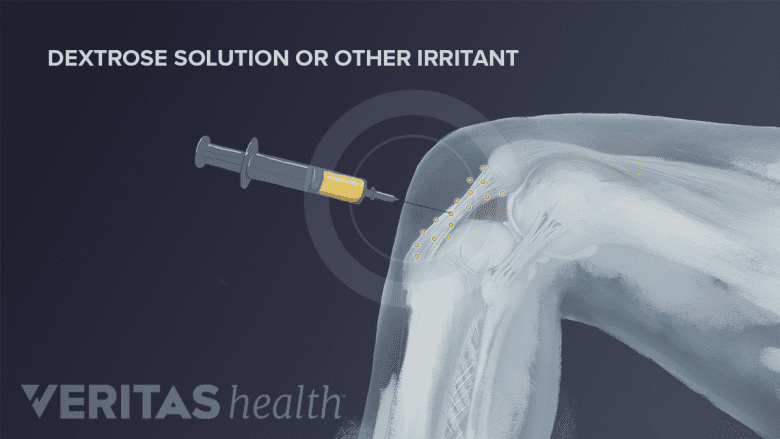Therapeutic knee injections can reduce painful symptoms related to knee osteoarthritis. Injections are often used in conjunction with other nonsurgical treatments—such as physical therapy, bracing or medications.
Knee injections typically deliver medicine directly inside the knee joint capsule. Ultrasound may be used to help guide placement of an injection.
This page describes different injections available, including cortisone, hyaluronic acid, platelet rich plasma (PRP), and stem cell injections, as well as prolotherapy. A physician and patient can discuss these options and decide which, if any, therapy is most appropriate.
Cortisone Injections for Knee Arthritis
Cortisone injections work by treating the inflammation that can cause knee pain, swelling, and warmth. The effects of a cortisone injection can last from 3 weeks to 3 months, and occasionally longer.
See Cortisone Injections (Steroid Injections)
People who want quick, temporary relief from knee arthritis pain may choose to have a cortisone injection. The temporary pain relief may allow a person to engage in physical therapy; attend to an important life event, such as a long-planned vacation; or postpone knee replacement surgery to a later, more convenient time.
Hyaluronic Acid Injections for Knee Arthritis
A hyaluronic acid injection delivers lubricating fluid into the knee joint. The goal is to temporarily lubricate the knee joint, thereby decreasing knee pain and inflammation, improving knee function, and perhaps even slowing the degeneration process.
See Hyaluronic Acid Injections for Knee Osteoarthritis
Generally, hyaluronic acid injections are slower to take effect than cortisone injections; however, the positive effects may last longer.
See Do Hyaluronic Acid Injections Work for Knee Osteoarthritis?
These injections are sometimes called viscosupplementation injections.
See Hyaluronic Acid Injection for Knee Osteoarthritis: Procedure and Risks
Platelet Rich Plasma Injections (PRP Injections) for Knee Arthritis
Platelet-rich plasma therapy attempts to take advantage of the blood's natural healing properties to repair damaged tissue. It is derived from a sample of the patient's own blood and contains higher concentration of platelets than is found in normal blood.
See Platelet-Rich Plasma (PRP) Therapy for Arthritis
There is growing evidence that suggests PRP injections may work to treat knee osteoarthritis in some people, but they remain controversial. PRP injections are not considered standard practice.
See Efficacy of Platelet-Rich Plasma Injections
Stem Cell Injections for Knee Arthritis
Researchers theorize that, when injected into to an osteoarthritic knee, stem cells might develop into cartilage cells; suppress inflammation; slow down cartilage degeneration; and/or decrease knee pain. The stem cells used in these injections are usually collected from the patient’s fat tissue, blood, or bone marrow.
Whether stem cell injections are effective in treating osteoarthritis is a controversial subject. Like PRP injections, stem cell injections are not considered standard practice.
Prolotherapy for Knee Arthritis

Prolotherapy typically involves 15-20 injections into the affected soft tissue.
The goal of prolotherapy is to stimulate natural tissue repair in the body. During treatment, a physician will inject an irritant, such as a dextrose solution, into the arthritic knee joint and surrounding tissues. Several injections—perhaps 15 or 20—will be made during one treatment session.
Prolotherapy temporarily increases inflammation. The hope is that the additional inflammation will facilitate further healing.
Some clinical research studies suggest prolotherapy is effective in treating knee osteoarthritis,1Rabago D, Patterson JJ, Mundt M, Kijowski R, Grettie J, Segal NA, Zgierska A. Dextrose prolotherapy for knee osteoarthritis: a randomized controlled trial. Ann Fam Med. 2013 May-Jun;11(3):229-37. doi: 10.1370/afm.1504. Erratum in: Ann Fam Med. 2013 Sep-Oct;11(5):480. PubMed PMID: 23690322; PubMed Central PMCID: PMC3659139.,2Hassan F, Trebinjac S, Murrell WD, Maffulli N. The effectiveness of prolotherapy in treating knee osteoarthritis in adults: a systematic review. Br Med Bull. 2017;122(1):91-108. but these studies vary in quality. Prolotherapy is controversial and not considered standard practice.
Prolotherapy is not appropriate for most people with inflammatory forms of arthritis, such as rheumatoid arthritis or gout.
- 1 Rabago D, Patterson JJ, Mundt M, Kijowski R, Grettie J, Segal NA, Zgierska A. Dextrose prolotherapy for knee osteoarthritis: a randomized controlled trial. Ann Fam Med. 2013 May-Jun;11(3):229-37. doi: 10.1370/afm.1504. Erratum in: Ann Fam Med. 2013 Sep-Oct;11(5):480. PubMed PMID: 23690322; PubMed Central PMCID: PMC3659139.
- 2 Hassan F, Trebinjac S, Murrell WD, Maffulli N. The effectiveness of prolotherapy in treating knee osteoarthritis in adults: a systematic review. Br Med Bull. 2017;122(1):91-108.

